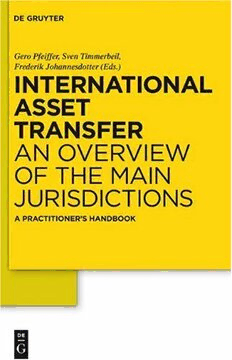
International Asset Transfer: An Overview of the Main Jurisdictions. A Practitioner's Handbook PDF
659 Pages·2009·2.123 MB·English
Most books are stored in the elastic cloud where traffic is expensive. For this reason, we have a limit on daily download.
Preview International Asset Transfer: An Overview of the Main Jurisdictions. A Practitioner's Handbook
Description:
Assets (property, operational facilities) associated with cross-border business transactions must often be transferred and thereby, consistently require numerous transfer documents for different legal systems. Consultants working on such transfers need to have an overview of the process, time frames, and particularities, and must also be able to determine if additional local advisors need to be consulted. Systematic surveys or compilations of the particularities of the diverse legal systems have not been available up to now. This handbook for the consulting practice contains 32 of the most important legal systems (Europe, North America, South America, Asia, Australia) and provides essential information relating to the transfer of assets. A separate section is dedicated to each legal system. The following topics, among others, are discussed: forms, registration obligations, compliance requirements (e.g. state sites), taxes, insolvency law particularities, cost issues as well as the transfer of employees. The goal of the handbook is to enable the user to be able to better estimate the legal and actual risks and time and effort associated with local asset transfers and thereby, establish a foundation for the decision making process. This presentation is primarily geared towards attorneys in law firms and law departments, but also consultants in the M&A field (investment bankers, tax advisors, auditors, etc.). The sections were prepared by practicing attorneys in the relevant legal system. All authors practice in established international corporate law firms.
See more
The list of books you might like
Most books are stored in the elastic cloud where traffic is expensive. For this reason, we have a limit on daily download.
